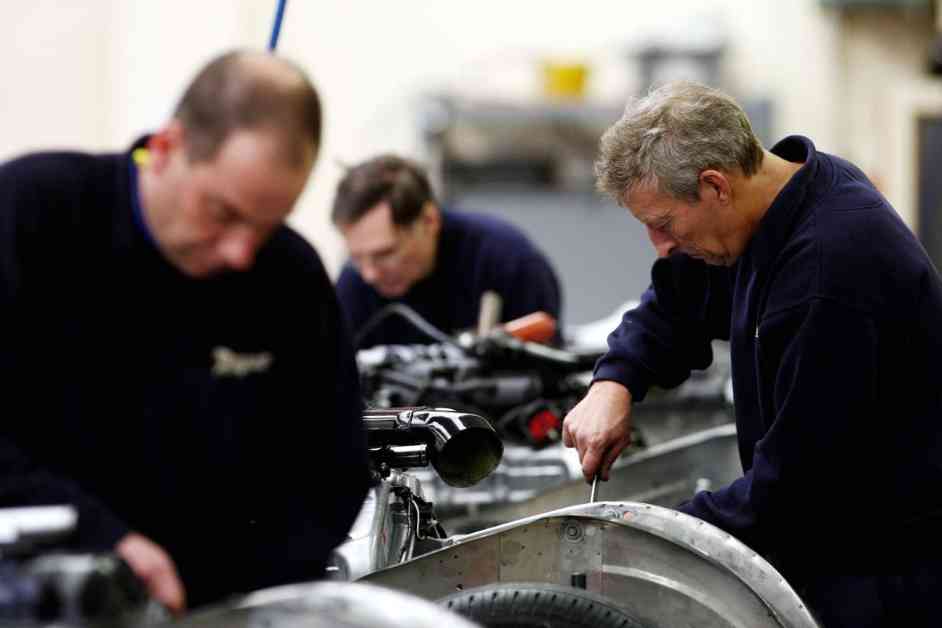UK Manufacturing Growth Hits Two-Year High Amid Easing Inflation
The UK’s manufacturing sector experienced a significant boost in August, with growth hitting a two-year high. This positive development comes as inflationary pressures for firms and customers show signs of easing, according to the latest data from the S&P Global UK manufacturing PMI survey.
The survey recorded a reading of 52.5 for August, up from 52.1 in the previous month. This reading, the highest in 26 months, is in line with analysts’ expectations. Any reading above 50 indicates growth in the sector, while a score below 50 signifies contraction.
Rob Dobson, director at S&P Global Market Intelligence, highlighted the positive impact of the manufacturing sector on the broader economy. He noted that the upturn in manufacturing is broad-based, with the investment goods sector standing out as a top performer.
Export Orders Present a Challenge
Despite the overall growth in the manufacturing sector, the trend in export orders remains a cause for concern. New business from overseas has been declining continuously since early 2022. This decline in export orders is primarily driven by weaker demand in Europe and the ongoing slowdown in mainland China.
While the UK market has been driving growth in new contracts, the persistent decrease in export orders poses a challenge for manufacturers. Companies are grappling with the impact of reduced demand from international markets, highlighting the need for strategies to bolster exports and diversify revenue streams.
Positive Signs of Recovery
The latest data indicates a positive trend in key areas of manufacturing, including output, new orders, and employment. Manufacturing production has increased for the fourth consecutive month, with companies ramping up output in response to growing orders and efforts to fulfill existing contracts.
The improvement in new business is attributed to better market sentiment, following a reduction in interest rates. Despite challenges in export orders, domestic demand has been a driving force behind the growth in new contracts, signaling resilience in the UK market amid global economic uncertainties.
The increase in job creation at manufacturing firms is a notable outcome of higher output and new order volumes. Growth in employment has reached its highest level in over two years, reflecting the sector’s contribution to job creation and economic recovery.
Challenges and Opportunities Ahead
While the manufacturing sector in the UK is experiencing growth, there are challenges that need to be addressed to sustain this positive momentum. The ongoing decline in export orders underscores the importance of diversifying markets and enhancing competitiveness in the global arena.
Firms are also navigating rising input costs, although at a slower rate, with selling prices seeing a moderation in increases over the month. Managing cost pressures while maintaining profitability remains a critical aspect for manufacturers as they seek to balance operational efficiency with market dynamics.
Innovation and technology adoption are key drivers of growth in the manufacturing sector, offering opportunities for companies to enhance productivity, streamline processes, and meet evolving customer demands. Investing in research and development, upskilling the workforce, and fostering collaboration within the industry can position manufacturers for long-term success.
Looking Ahead: A Resilient Manufacturing Sector
Despite the challenges posed by fluctuating market conditions and global uncertainties, the UK manufacturing sector demonstrates resilience and adaptability in navigating complex economic landscapes. The recent growth in manufacturing output, new orders, and employment signals a positive trajectory for the sector, driven by domestic demand and strategic initiatives to boost productivity and competitiveness.
As manufacturers continue to innovate, diversify, and invest in sustainable practices, they are well-positioned to capitalize on emerging opportunities and strengthen their position in the global market. By leveraging technology, talent, and strategic partnerships, the UK manufacturing sector can build a sustainable future and contribute to economic growth and prosperity.












